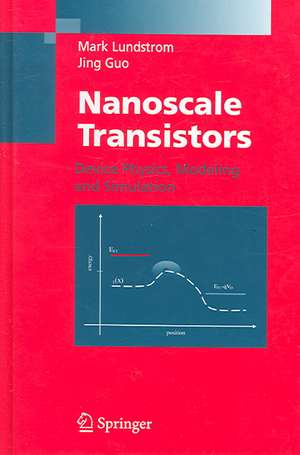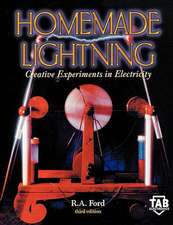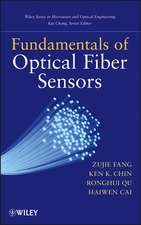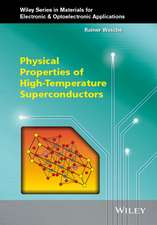Nanoscale Transistors: Device Physics, Modeling and Simulation
Autor Mark Lundstrom, Jing Guoen Limba Engleză Hardback – 9 dec 2005
| Toate formatele și edițiile | Preț | Express |
|---|---|---|
| Paperback (1) | 637.13 lei 6-8 săpt. | |
| Springer Us – 29 oct 2010 | 637.13 lei 6-8 săpt. | |
| Hardback (1) | 642.83 lei 6-8 săpt. | |
| Springer Us – 9 dec 2005 | 642.83 lei 6-8 săpt. |
Preț: 642.83 lei
Preț vechi: 756.27 lei
-15% Nou
Puncte Express: 964
Preț estimativ în valută:
123.02€ • 127.09$ • 102.38£
123.02€ • 127.09$ • 102.38£
Carte tipărită la comandă
Livrare economică 25 martie-08 aprilie
Preluare comenzi: 021 569.72.76
Specificații
ISBN-13: 9780387280028
ISBN-10: 0387280022
Pagini: 217
Ilustrații: VIII, 218 p. 106 illus.
Dimensiuni: 155 x 235 x 18 mm
Greutate: 0.49 kg
Ediția:2006
Editura: Springer Us
Colecția Springer
Locul publicării:New York, NY, United States
ISBN-10: 0387280022
Pagini: 217
Ilustrații: VIII, 218 p. 106 illus.
Dimensiuni: 155 x 235 x 18 mm
Greutate: 0.49 kg
Ediția:2006
Editura: Springer Us
Colecția Springer
Locul publicării:New York, NY, United States
Public țintă
ResearchCuprins
Basic Concepts.- Devices, Circuits, and Systems.- The Ballistic Nanotransistor.- Scattering Theory of the MOSFET.- Nanowire Field-Effect Transistors.- Transistors at the Molecular Scale.
Notă biografică
Mark S. Lundstrom is the Scifres Distinguished Professor of Electrical and Computer Engineering at Purdue University where he also directs the NSF Network for Computational Nanotechnology. His current research interests center on the physics of semiconductor devices, especially nanoscale transistors. His previous work includes studies of heterostructure devices, solar cells, heterojunction bipolar transistors and semiconductor lasers. During the course of his Purdue career, Lundstrom has served as director of the Optoelectronics Research Center and assistant dean of the Schools of Engineering. He is a fellow of both the Institute of Electrical and Electronic Engineers (IEEE) and the American Physical Society and the recipient of several awards for teaching and research — most recently the 2002 IEEE Cledo Brunetti Award and the 2002 Semiconductor Research Corporation Technical Achievement Award for his work with his colleague, S. Datta, on nanoscale electronics.
Jing Guo is an assistant professor of Electrical and Computer Engineering at University of Florida, Gainesville. His has worked on the theory, modeling and simulation of a variety of nanotransistors, including silicon nanotransistors, carbon nanotube transistors, and single electron transistors, in close collaboration with experimentalists. His current research interests focus on modeling and simulation of nanoscale devices, carbon nanotube electronics and optoelectronics, quantum transport, physics of nanoscale transistors, and parallel computation.
Jing Guo is an assistant professor of Electrical and Computer Engineering at University of Florida, Gainesville. His has worked on the theory, modeling and simulation of a variety of nanotransistors, including silicon nanotransistors, carbon nanotube transistors, and single electron transistors, in close collaboration with experimentalists. His current research interests focus on modeling and simulation of nanoscale devices, carbon nanotube electronics and optoelectronics, quantum transport, physics of nanoscale transistors, and parallel computation.
Textul de pe ultima copertă
NANOSCALE TRANSISTORS: Device Physics, Modeling and Simulation describes the recent development of theory, modeling, and simulation of nanotransistors for electrical engineers, physicists, and chemists working with nanoscale devices. Simple physical pictures and semi-analytical models, which were validated by detailed numerical simulations, are provided for both evolutionary and revolutionary nanotransistors. Chapter 1 reviews some basic concepts, and Chapter 2 summarizes the essentials of traditional semiconductor devices, digital circuits, and systems. This material provides a baseline against which new devices can be assessed. Chapters 3 and 4 present a non-traditional view of the MOSFET using concepts that are valid at nanoscale. Chapter 5 applies the same concepts to nanotube FET as an example of how to extend the concepts to revolutionary nanotransistors. Chapter 6 explores the limits of devices by discussing conduction in single molecules.
The book is a useful reference for senior-level or graduate-level courses on nanoelectronics, modeling and simulation. It is also valuable to scientists and engineers who are pushing MOSFETs to their limits and developing revolutionary nanoscale devices.
The book is a useful reference for senior-level or graduate-level courses on nanoelectronics, modeling and simulation. It is also valuable to scientists and engineers who are pushing MOSFETs to their limits and developing revolutionary nanoscale devices.
Caracteristici
Presents most recent developments on theory, modeling and simulation of nanoscale transistors Provides tools necessary to push traditional electronic debvices to their limits and to develop new devices that will follow the MOSFET Includes supplementary material: sn.pub/extras







